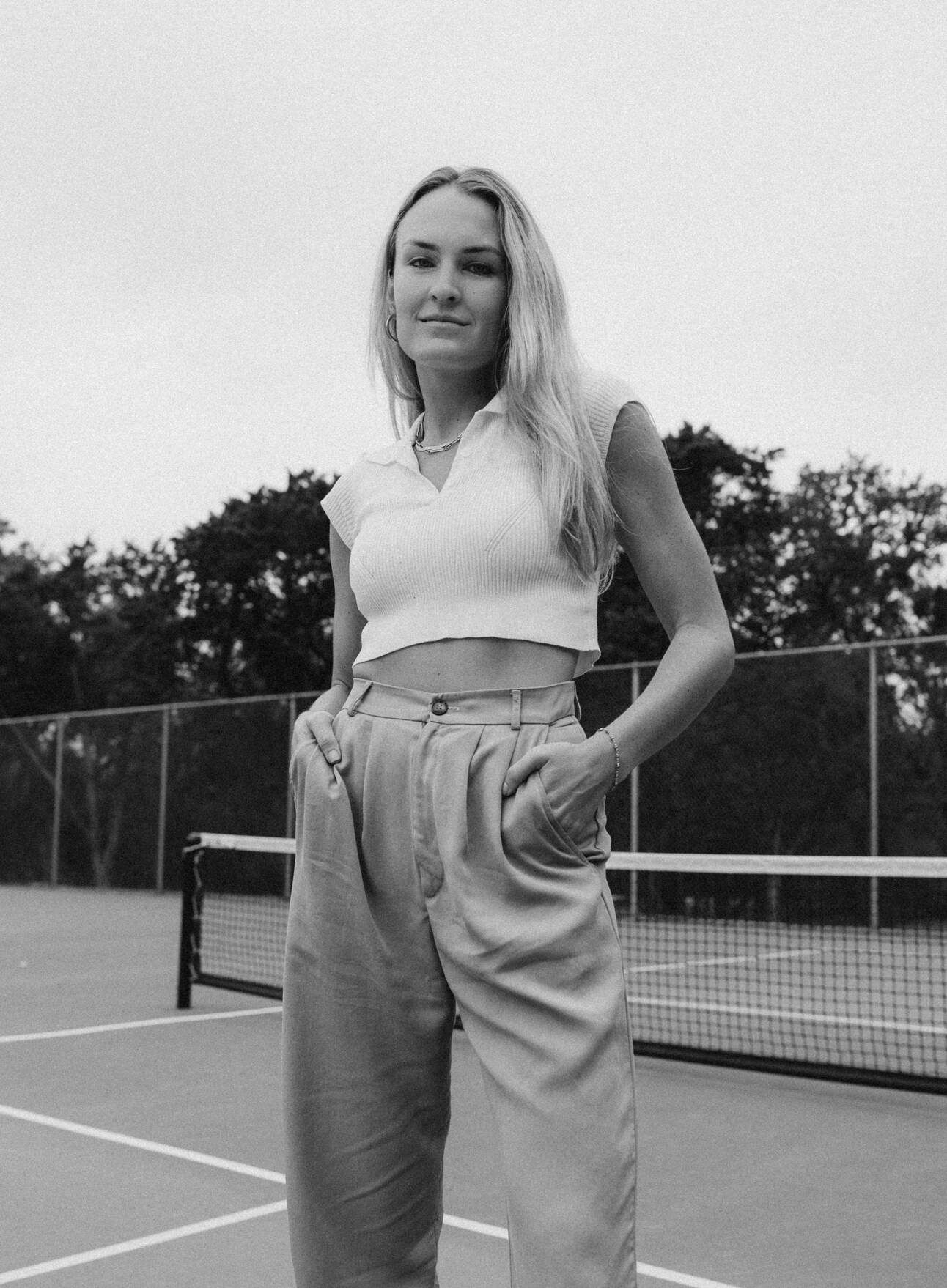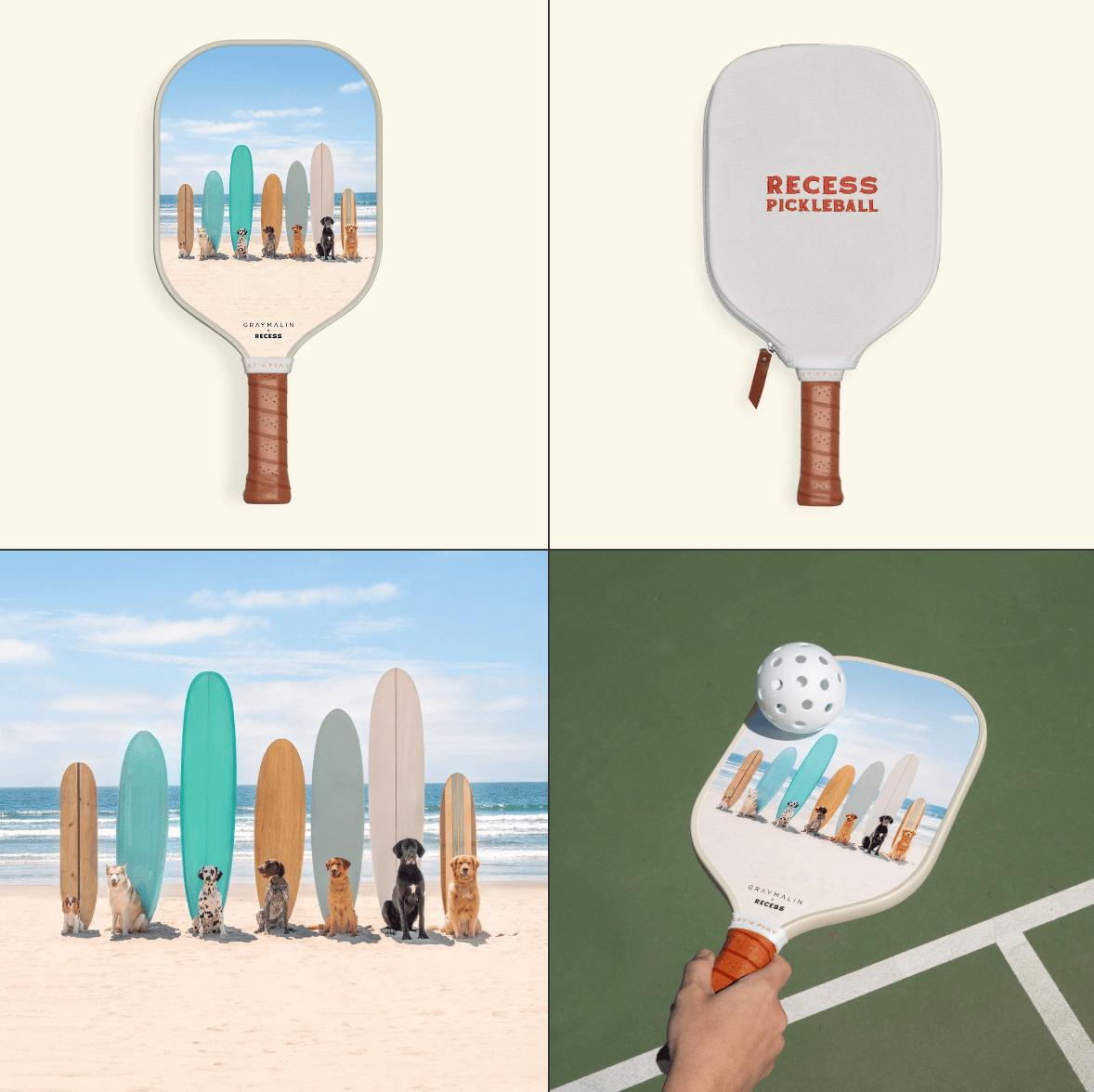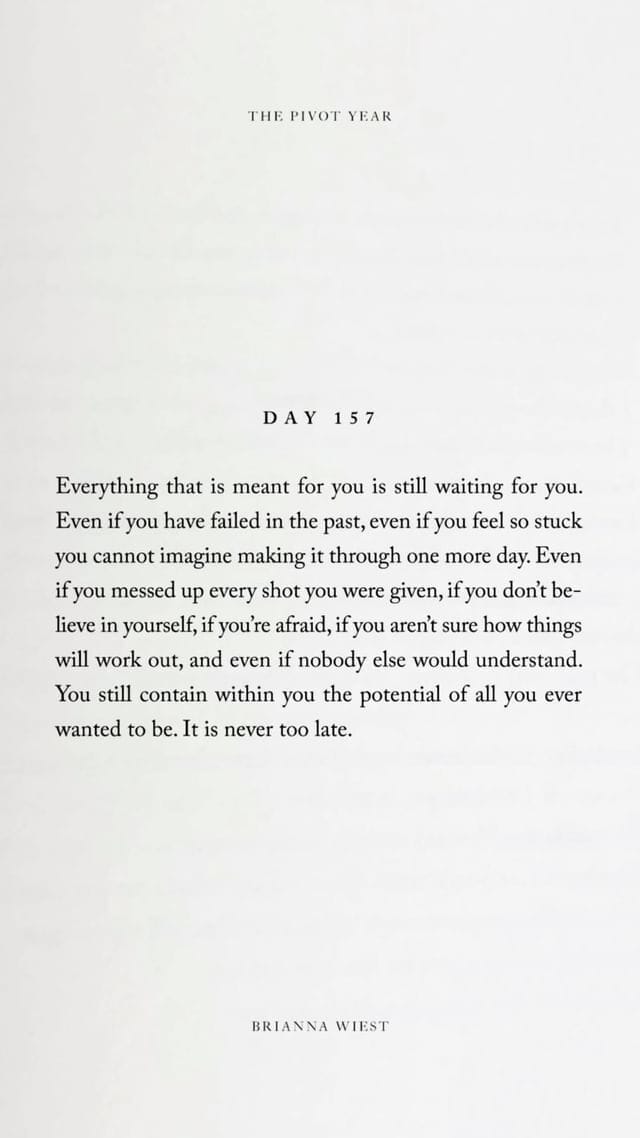- lazy girl capital
- Posts
- How Maggie Brown Designed Pickleball's First Ever Sneaker
How Maggie Brown Designed Pickleball's First Ever Sneaker
We're All Sellouts | Why We're Causing Celebs to Invest in Failing Companies
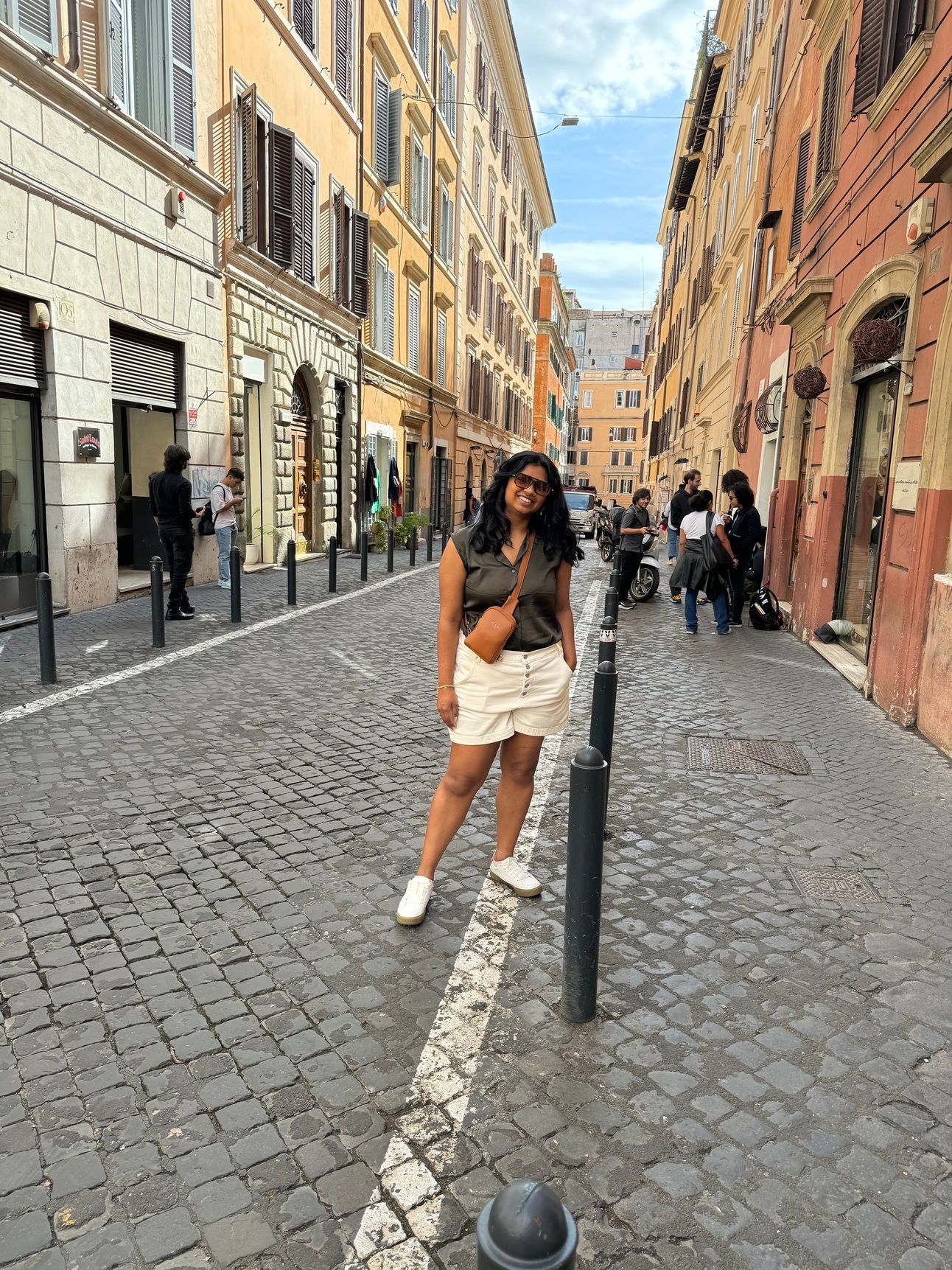
I know I always incorporate in various moments on social that made me analyze question, reflect, celebrate or call out society’s actions as a whole, but I want to take a break. As I’m writing this, I’m currently in Rome.
As much as I think that I have a unique perspective in relation to how I view culture, human behavior/psychology, religion, relationships, which then informs my meta theses in VC and more so life, I need to feel more grounded by the outside world. Something that has been living rent free in my head is how the more successful you get the more imposter syndrome you feel…I know traveling won’t suddenly provide me the answers to everything I’m grappling with, but I’m certain if I lean in for the next week or so I could recalibrate.
Going off the theme of friend net worth from last week, I’ve been thinking about we share all of our purchases, where we travel, and how we spend every waking minute of everyday, but we forget to mention the people that we’re with us in that moment and how they made us feel. We forget to acknowledge those mini breakthrough moments that took place over a phone call, text, voice note, a meal, or a drink. Instead we stay so laser focused on what we are consuming…like how much more capitalistic can we get y’all???
I want to spend more time sharing those moments instead of just how I’m reacting to a piece of content and why I think we need to be more critical of the systems in place lol…While I do that, I’m going to return to reintroduce yoga into my life. I became certified as a yoga teacher almost three years ago, and I haven’t practiced yoga in over a 9 months. As shitty as my life felt for the past four years, yoga was always something that humbled me by meeting me where I was at.
Maggie Brown is the founder and CEO of Recess Pickleball, a dynamic lifestyle pickleball brand based in Austin, Texas. Since the company’s founding in 2021, Maggie has been the driving force behind its explosive growth, transforming it from a pandemic passion project to a renowned pickleball gear company with a focus on quality and design.
Prior to establishing Recess Pickleball, Maggie worked in strategic partnerships for Uber, where she played an instrumental role in growing the food delivery market. Maggie also served as Vice President of Action in Africa, a nonprofit and community-based organization that operates a thriving community center in Uganda.
Maggie graduated from The University of Texas at Austin, where she received her B.S. in International Relations and Affairs in 2016. When she’s not busy leading Recess, Maggie loves traveling, being outside, and hosting dinner parties.
What was the impetus for starting Recess with you and your co-founder?
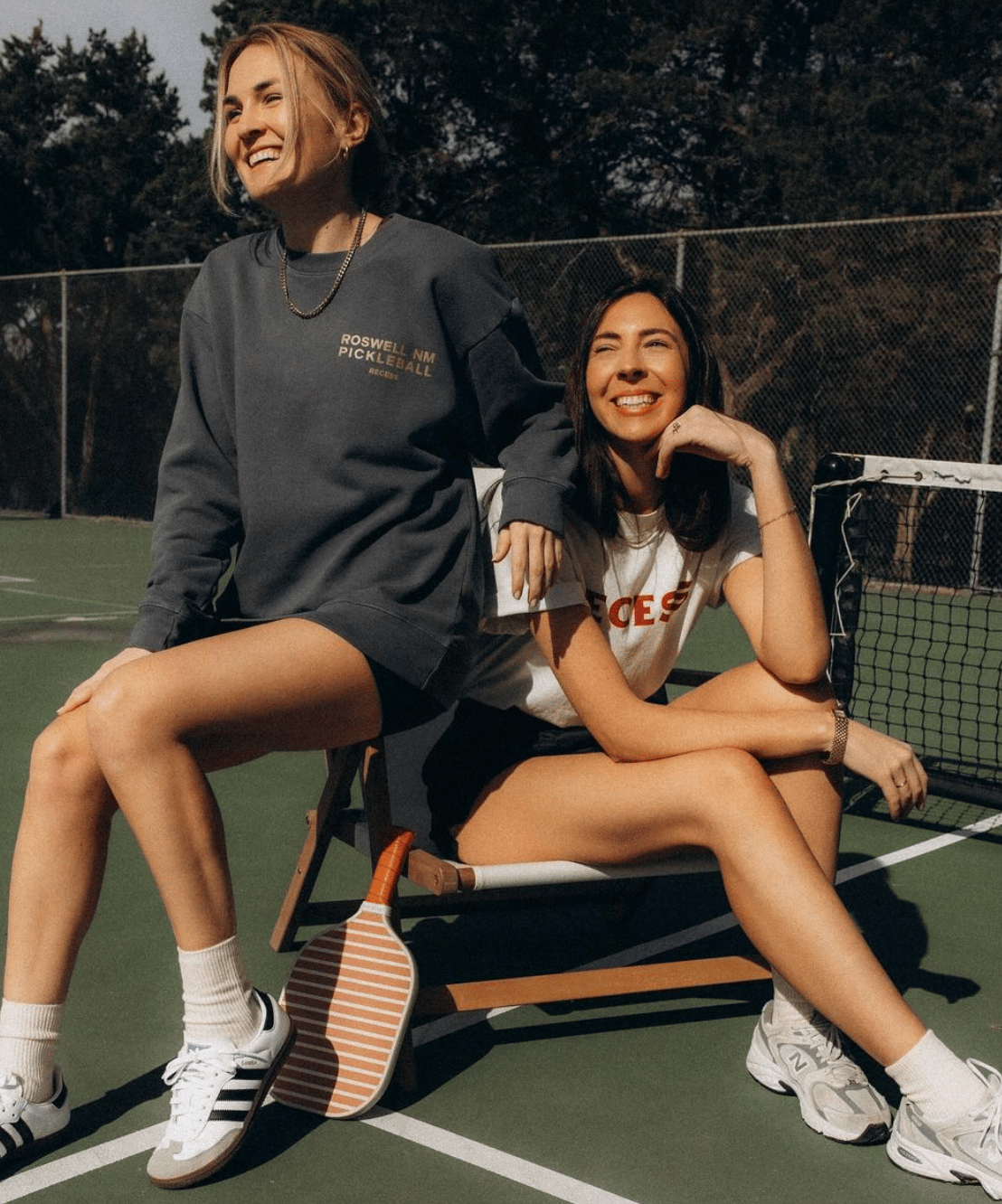
From the very beginning, I've always had an entrepreneurial zest to do something. I've been so into lifestyle brands and watching the evolution of so many businesses, especially in the direct-to-consumer space, come to life over the last decade. At the time, I was working at Uber. I worked at the office here in Austin for four and a half years—two years pre-IPO and two years post-IPO. I had such a great experience there; it felt like a pioneer phase.
Fast forward to COVID, it was one of the few businesses that was absolutely insane. At the same time, I had moved to my mom's in New Mexico because she lives on seven acres with a big property. I was working a ton and felt we needed something to do, some sort of outlet. I grew up playing tennis and decided to build a pickleball court in the driveway. We started playing every day. It was something really special during COVID that totally changed my family dynamic because everyone could play.
Back in Austin, I was trying to find a gift to give to my mom for letting me stay there for six months. I decided on pickleball paddles, new ones, because we had just gone to Dick's and whatever was on the shelf wasn't appealing. I thought, "I could make really cool paddles for people like me who just want to play recreationally but want something that looks modern, not like it was made in the early 2000s with neon, black, feathers, and dragons."
I recruited one of my friends, Grace, who I've known since elementary school. She's very good with prints, designs, and visual identity. I asked her to help me bring this idea to life quickly. She had so much fun working on the project that she wanted to do it with me. We work really well together. From there, Recess was born. We launched out of my living room with 600 paddles. We sold so many on the first day that we were like, "Oh, we need more." Fast forward, that was three years ago, and now we have a 9,000 square foot warehouse in Austin where we manufacture about 500 paddles per day.
From a team standpoint, is it just you and your co-founder right now? How have you thought about growing your team over the years?
Our team is up to about 18 people now. We do a lot together, but she oversees more of the design, color, aesthetic, and creative aspects. I also love that side of the business but manage more of the operations and finance. It's great because we both have our lanes, but we also share a lane in terms of aesthetic, visual brand identity, and entrepreneurship. We flip that lane but then divide and conquer in our separate lanes.
We raised money about two years ago, which was great. We partnered with a VC based out of LA that we're huge fans of. They've been really helpful in getting the right people in place to support the founders. Founders are scrappy and have vision. It's been nice to recruit people who can supplement in areas where it's not necessarily our strengths.
How did you think through the process of raising money and understanding how to diligence investors to ensure that they would be the right fit for Recess?
It's super hard. We were very into bootstrapping in the beginning, but bootstrapping is a little glorified when you have product-market fit right away. To be completely honest, I had no idea what I was doing raising money. We were getting so many unsolicited inbounds from different VCs and investors interested in the pickleball space. Recess was really the first lifestyle brand to enter into the category.
In terms of diligence, we met with a lot of different ones over Skype and in person. It's like dating; you just kind of know. We were very attracted to the model of the VC we chose. They are very cross-functional within the portfolio, which was a huge value add. There's no gatekeeping between the companies, so we have a lot of advisors from other successful brands and businesses. It's an ecosystem that really wants to help each other, and that was extremely attractive to us.
Do you plan on raising again, or do you feel okay with where Recess is right now? How are you thinking about Recess’s long-term growth?
The market and atmosphere have changed so much. It's about getting profitable and building a good business. We've grown so much in the last three years, going 100 miles per hour without looking left or right. We're taking some time to put the brakes on and ensure we have a foundation in place that will support the longevity of Recess.
It's been interesting to watch so many companies that we all admired five or ten years ago go through some really hard times because they raised so much money and weren't profitable, and frankly, weren't building good businesses. That’s our number one focus. I think if the opportunity to raise money comes, we would do it to grow the business in a really healthy way, and if we had proof of another product resonating with our customer. We are definitely open to it, but we never want to be in a position where we're raising out of desperation.
We've never really thought from a position of virality and trying to create as many TikToks or Instagrams as possible to be viral. We've had a lot of incredible success with collaborations. That's been a huge part of our strategy—partnering with other people and brands who have similar synergy to promote and elevate us even more.
One thing we're really leaning into in terms of engagement is that we've been heads down so much for the past three years that we really haven't even scratched the surface in terms of telling our story or the ins and outs of Recess on a day-to-day basis. With community marketing being at the forefront, especially for D2C brands moving forward, there's this level of transparency and behind-the-scenes that's kind of expected. We're really excited to lean into that and bring people in from the beginning.
Also, I personally want to inspire the next entrepreneurs and share more of my story. I try to show that it is accessible to build a brand you’re proud of.
How did you start building a pipeline and landing partnerships with brands like Alo Yoga and Reebok and athletes like Nastia Liukin?
So much of our success has been from unsolicited inbounds. Something that Recess has done right from the beginning is having a non-negotiable stance on our brand—what we stand for, how we look, how we come across. It's extremely consistent, and people really value and feel connected to that. As a result, and with pickleball being so viral and everybody wanting a piece of the excitement, we've become the go-to brand for facilitating collaborations.
For the first time, we've been navigating how to say no, which is really hard. Being able to say, "Actually, no, that's not what we're doing with our brand," regardless of the monetary incentive, is crucial. As soon as you start saying yes to everything, you lose a little bit of the brand equity that we've built. Consistency is key. Know your audience and who they want to see you collaborate with, and it should be a natural synergy.
Something else we're exploring is understanding why we're collaborating with a partner. A lot of it can be just for brand awareness, which has been great. Having clear goals for why we're doing a collaboration is essential.
Which brand collaborations are you most proud of to date?
Reebok is definitely top of mind right now because it was our first, and we sold out pretty quickly in all the best sizes. It's something that we've been working on for a year because the whole process of designing a shoe, sampling, and bulk production takes so much time. It was the first time we launched a product with a pickleball adjacency.
But, my favorite collab ever was with Leanne Ford. She's an iconic interior designer. I never anticipated that she would be interested in pickleball. She reached out to us, and we actually got to meet her and spend the day with her. It felt so fun and good to see someone you've admired for so long be so receptive to what you've built and want to be part of it.
What have been some of the biggest lessons or myths you've learned going into this process and throughout the past few years?
I think for us, we've been lucky to have a really great investor partnership that genuinely cares about us. You hear a lot of talk about those relationships or about people getting screwed. I think we've taken a really positive approach. In the beginning, it's hard because you almost treat them like parents. One of the best pieces of advice one of our advisors gave us was, "You need to stop. This is not show and tell. These are not your parents. You need to treat them as business partners and lean on them for expertise and advice. Ask questions that you genuinely don't know the answer to where they can be helpful." It totally changed the way our board meetings and everything are facilitated.
How did you get over that initial hump of show and tell? How did you get to the point where you got comfortable with asking questions?
I think it takes time. The immediate validation of the first time we did it, when we were uncomfortable because something wasn't going well, helped. For example, we had ordered way too much inventory. We realized it is not uncommon to experience this. We asked, "What should we do? How do we move forward from this point, making the best decision we can?" And they immediately started brainstorming and were helpful. We got through it, and it wasn't about trying to sugarcoat things or push them under the rug.
What are some of the key pillars for you that you want consumers to walk away with when interacting with Recess for the first time?
One of the words we really focus on is "approachable." Every piece of content, everything we do, we want people to feel like they can be part of it. The same goes for when we're deciding on collaborations. In the beginning, it's about being very particular about your brand identity. For example, if J. Crew wants to work with us and suggests different color options, we stick to our brand elements like the leather grip on the paddles and the cream edge guard. When you put your foot down on certain things, people appreciate it. Having parameters and rules, and not being afraid to push boundaries in a polite and kind way, makes people receptive.
How has being based in Austin been valuable for Recess as a business, brand, and for you as a founder?
I love Austin so much, and it's been an amazing place to start a company. It's still small enough that you have access to some of the best brands that were incubated or started here. For example, Tecovas, Yeti, and Poppi. You have access to people who are willing to work with you, share their experiences, and help other Austin entrepreneurs. Additionally, so much of what we do is creative and brand-focused, and Austin is truly one of the most creative environments. It's also been helpful with COVID, as so many people moved here. So, the talent pool has gotten even better.
Who has been an inspiration throughout this process that is a female founder that you would want to highlight?
I think the biggest one who I love so much is Emma Grede. She's the co-founder of Skims and Good American. I love following her on Instagram and I love listening to any podcast that she's on. I think she just, from a big perspective, hits a lot of the points that are so important in the entrepreneurship journey. And her push for positivity is amazing.
And then I love, a little smaller, but Diana Cohen from Crown Affair. She puts out such incredible content and it's super genuine and authentic. It really inspires me to live life every single day. It's really contagious, her love for Crown Affair and the product and what she's building. She truly is living it every single day, making content about it, and putting herself out there. I admire that so much because it's really hard to do.
What are you looking most forward to in the next year for Recess?
I’m looking forward to the launch of a Small Apparel Capsule Collection that we learned so much about. It's an entirely new business but has seen a lot of clear signals. We've been working really hard to perfect a lot of the feedback that we've gotten to simplify it. I'm excited for that to re-launch in the spring. We have a couple of really exciting collaborations next year that are going to be fun and different. I'm also really excited about the community engagement and sharing more of the day-to-day, what's happening behind the scenes here, how we interact with our team, our community, the product, etc (make sure to follow Maggie and Grace’s building in public series 😉)
What have you been listening to, reading, and or watching that's just brought you joy?
Every single morning I read, there's this book, it's called The Pivot Year by Brianna Wiest. I'm probably on day 52 or something. I write in the book every day, so it's easier to have it all in one place. Full transparency, I've been on a podcast break because so much information can be overwhelming. I'm trying to be more introspective and make my own decisions. Have you heard of Roxie Nafousi? I read her book over a weekend almost a year ago. I always go back to it and apply some of the principles to my everyday life.
Sri - I read The Pivot Year daily and currently reading Roxie’s second book - Manifest Dive Deeper.
What activities or people have you been spending time with that have reinvigorated you during this time?
Outside of pickleball, I do a lot of yoga and go on a lot of walks. I'm trying to go back to the roots of what started recess, so I'm playing a little more tennis, which has been interesting.

My metta dream for this series is to talk to celeb or their manager’s/business partners about their angel portfolios, specifically Anjula Acharia.
The most underwhelming part of this whole celeb VC and founder thing is that “we” they’re haters/followers fuel everything they decide to start. That seems obvious, but if we didn’t give as much attention and waste time trying to check all them maybe they wouldn’t be as traumatized and feel like they need to go start a VC/PE firm or a VC-backed company to show how much additional value they can provide they world, especially for female celebs who under continuous scrutiny of their appearances.
Yes, I would love if every celeb would stop producing more and instead focus on funding founders and companies in unsexy and impact-forward industries with THEIR OWN MONEY not from another LP. I’m not saying that they need to stop operating and investing in the consumer space, but it would be refreshing if they moved away from it.
One example I love is John Legend’s investment into Fortuna Health. He said:
“A core component of health equity is making healthcare coverage easy to understand, navigate, and access. Fortuna Health's approach resonated with me by making Medicaid truly simple and intuitive. I'm proud to support their journey to combat health disparities and ensure patients get the care they need.”
Out of his entire portfolio on investments and brands, this is the only one that stands out. How can we see more celebs make similar investments or mission aligned companies?
I think it starts with us focusing on the system that built celebs to operate and function that way they do. Instead of judging their every action, we need to focus on giving more attention to companies like Fortuna. We need to go inward and spend less time listening to the hottest podcasts such as Call Her Daddy (can’t wait for this doozy of a deep dive). We need to spend less time consuming and engaging with any celeb related content and rather focus on amplifying the everyday innovator.
I know this is practically impossible….but our attention and convos need to shift now.
Wanna be besties?
Email me at [email protected]
Follow me on Linkedln
Follow me on Twitter
Follow me on Instagram

